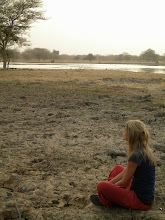As I left the Sevare Peace Corps bureau for site, a PCV from the stage above me left me with this parting consolation-- "If you cry your first night at site, don't worry. I did too." My initial reaction to this was surprise, then confusion, and finally appreciation. I was lucky enough to not be anywhere near this kind of mindset when I headed down the road for Pelleni-- I was thrilled. But her comment made me realize that we are all handling this experience with differing degrees of grace and panic and confusion and elation. A day later I found myself close to tears at site, but not out of sadness or fear. Rather, I found myself almost moved to cry because of a realization I had when sitting at one of the boutiques in town. I was watching a new friend, Khadija, breast feed her baby girl, and I realized all of the sudden that I would be able to see this child grow up so much in the next two years. I looked around at everyone in this scene that only a month ago seemed like it would always be foreign-- girls tressing each other's hair on plastic mats covering the trash-laden ground, men inhaling smoke from their pipes and cigarretes while taking in the new stock for the boutique, mothers clucking the town gossip to each other, their children tugging at their worn breasts for milk, flies swarming incessantly around bits of fallen meat or the open cuts on children's arms and legs, the constant thump of mortar and pestle from women grinding millet nearby. I realized for the first time that these will be my friends for the next two years, and hopefully for life. I finally took it all in, and exhaled happily...
___ ________ _________ ___________ _________
It continually blows my mind that I learned skills at home that are useful here in such a drastically different context. How to fix, start, and clean a gas lantern, for example. This is a simple but familiar skill I acquired that came in handy immediately at site, in the moonless darkness that only a Sahelian African village knows. This task I became practiced in after doing a hundred times in the most unlikely of places-- Burning Man.
Flashback to a dust storm in the middle of the desert, Black Rock City, Nevada... Dozens of half-naked and day-glo painted bodies, clad in bikini bottoms, face masks and swirling goggles, crouched over tables in an almost futile attempt to light hundreds of gas lamps for the ritual nightly Lamp Lighter's procession... all this in the dust and rain and wind before night fall, to the point that blisters formed on our fingers from switch after switch of the metal wheel of a lighter.
We always joked we were training for the apocalypse-- who knew I was really preparing myself for Africa?
Another example comes to mind: Making cordage and rope from discarded plastic bags. When I first did this at my happy hippy permaculture community home of Aprovecho in Oregon, it seemed like such the simple yet conscious, ingenuitive thing to do. Today I watched grown men engaged in the same activity at site, doing so not to be good environmentalists, but rather as a survival technique. They take what they get and do damn hard to make something out of it.
Which brings me to an interesting phrase we use in the U.S.-- "When life gives you lemons, make lemonade." We talk a lot in Peace Corps Mali about a concept related to this-- they dub it the 'value chain.' This is basically just the Econ 101 idea of value-added goods: you take a raw good, introduce some production process, and thereby develop a new finished product that will yield a higher profit. Every sector here is taught to promote this idea. But this lemony phrase-- this seemingly apt, simple and obvious statement, when reflected upon, reveals itself as entirely culturally relative. Even though it is about optivism, it is couched in economic presuppositions that don't necessarily exist everywhere. The cynical side of me wants to ask this burning question: What if life doesn't just simply give you lemons? What if you have to grow the lemons yourself? What if, in one scenario, you and your family have to spend every day planting and taking care of these lemon trees, because they're virtually the only thing that can grow in your region? What if you survive off of eating lemons, but to process them into a meal takes an entire day's work? Or in another scenario, if you're lucky enough to have more lemons to spare than just for your own subsistence, what if you spend all of your time and money to produce lemonade for retail (buying sugar, hauling water from a well, buying bags/bottles and extra ingredients, paying for the electricity and the usage of a fridge to cool it)? What if after all this, no one around you can afford to buy it except at a price that leaves your profit margin hanging on dimes and cents? These two scenarios parallel common income/food generating activities here-- harvesting millet to make toh for subsistence farmers in the North of Mali, and producing the hibiscus plant used all over West Africa to make a sweet crimson juice called dablini (or bissap).
I suppose this is why I'm not a Small Enterprise Development sector volunteer. Hopefully these "what if's" will find their answers for me in the next two years. For now, I am simply reminded of a line from a song school children in the south of Senegal sang to me once. It translates to this: "We, the cultivators, despite our misery, have never known despair."
Subscribe to:
Post Comments (Atom)


Nice picture, keep em coming!
ReplyDeleteI love reading your stories Sara, they transport me out of my world into something completely different...
ReplyDelete